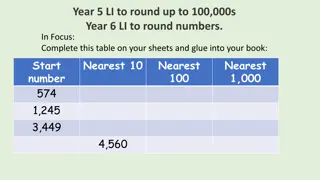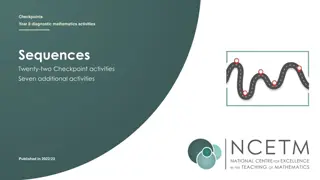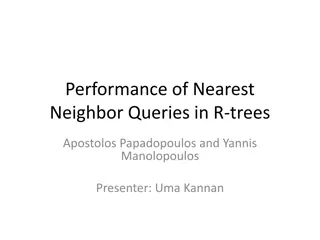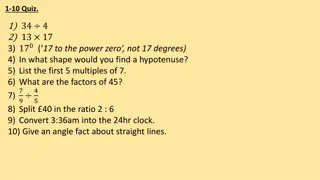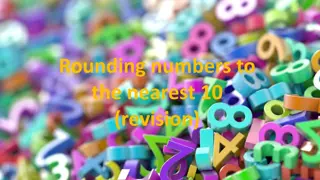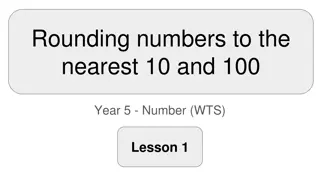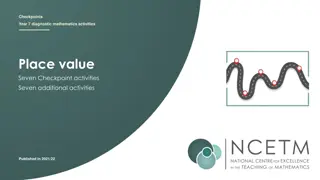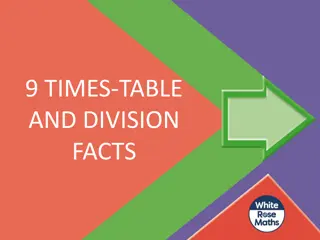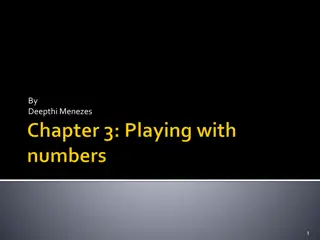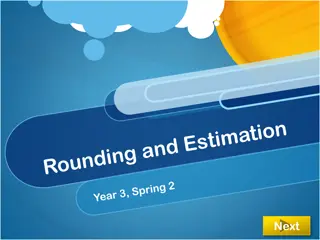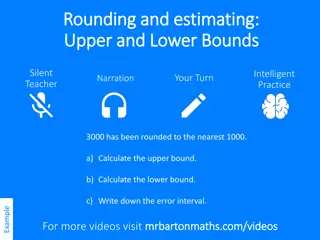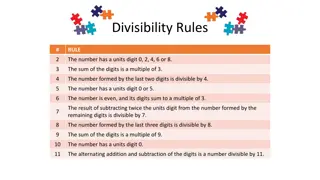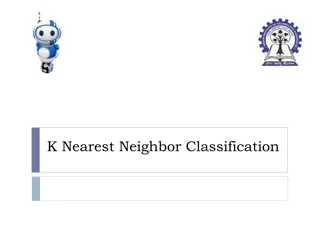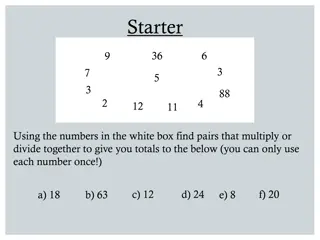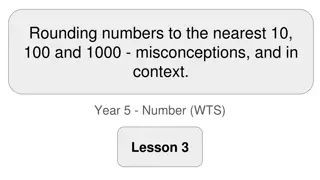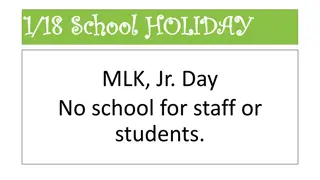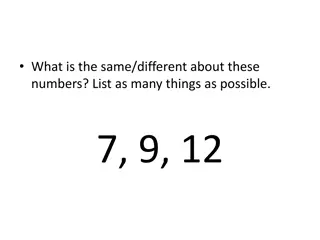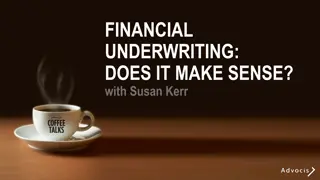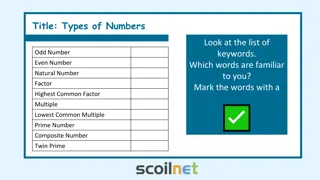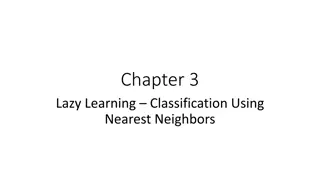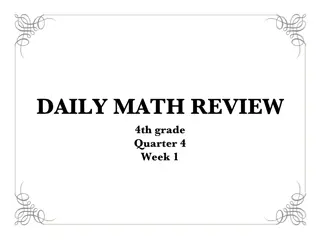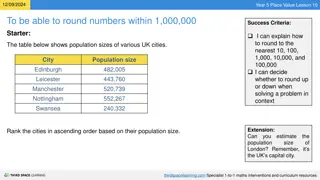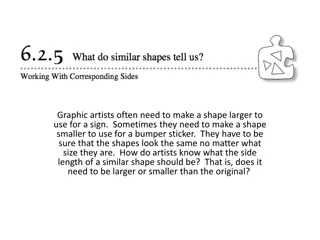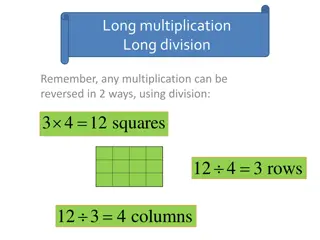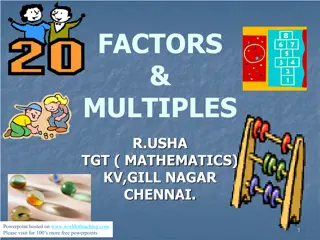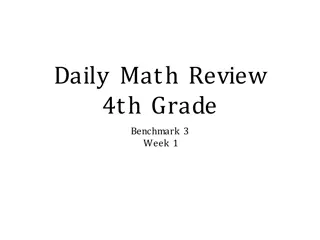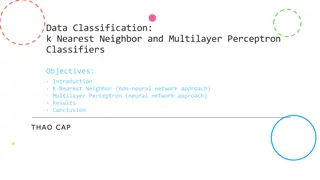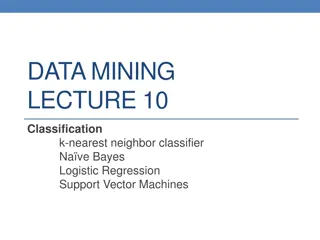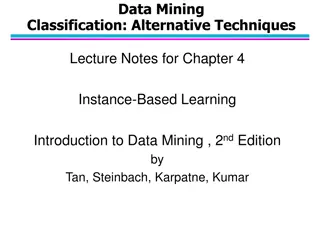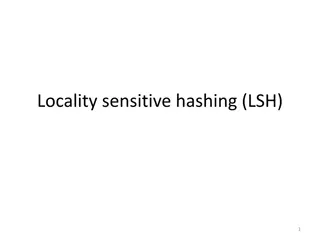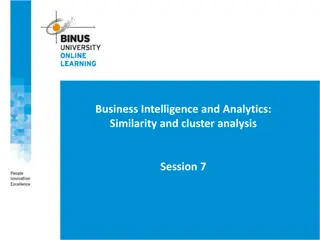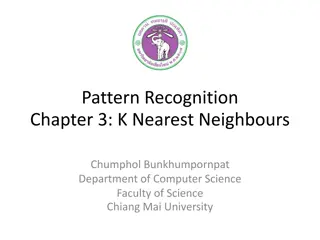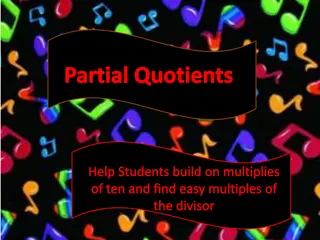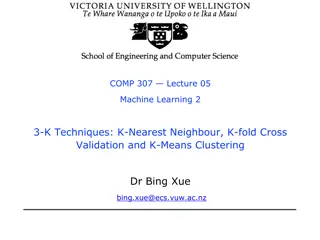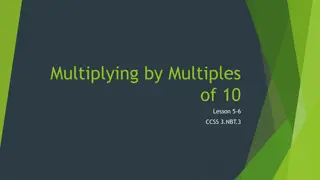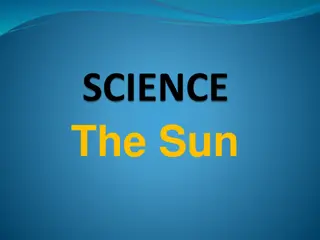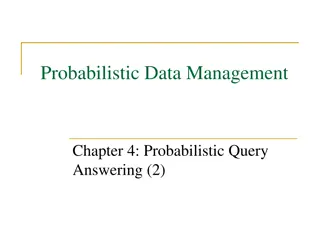Rounding Numbers and Identifying Nearest Multiples Practice Sheets
Practice rounding numbers to the nearest 10, 100, and 1,000, as well as identifying the nearest multiples of 10,000, 100,000, and 1,000,000. Complete tables, match numbers to their nearest values, and understand the concept of rounding within different ranges. Improve your math skills with these eng
0 views • 14 slides
Year 8 Mathematics Checkpoint Activities: Sequences & More
Dive into the diagnostic mathematics activities aimed at Year 8 students, focusing on sequences. The publication includes twenty-two Checkpoint activities with additional exercises, covering topics like adders, counting counters, same jump comparisons, and multiples. Explore the underpinnings of mat
0 views • 51 slides
Performance of Nearest Neighbor Queries in R-trees
Spatial data management research focuses on designing robust spatial data structures, inventing new models, constructing query languages, and optimizing query processing. This study explores the estimation of query performance and selectivity, specifically in R-trees, for efficient access planning.
3 views • 32 slides
Math Quiz and Venn Diagrams
Venn diagrams for sorting numbers, probability calculations, the concept of angles in straight lines, and various math questions including factors, multiples, ratios, and conversion between 12-hour and 24-hour clocks are discussed in this educational content. The content also illustrates scenarios w
0 views • 25 slides
Mastering Rounding Numbers to the Nearest 10: A Comprehensive Guide
Dive into the world of rounding numbers to the nearest 10 with this informative guide. Learn the steps to round any number, including those with multiple digits, and practice your skills with interactive examples. Discover a helpful rhyme to remember the rounding rules and explore scenarios when rou
4 views • 9 slides
Rounding Numbers to the Nearest 10 and 100 for Year 5 - Lesson 1
In this lesson, students will learn how to round numbers to the nearest 10 and 100. Key concepts covered include identifying the nearest multiple to a number, deciding whether to round up or down, and exploring possibilities when rounding. The lesson builds upon Year 3 and 4 knowledge and emphasizes
2 views • 14 slides
Mathematics Checkpoints and Activities for Year 7 Students
Explore a series of mathematics checkpoints and activities designed for Year 7 students, focusing on place value, comparing representations, calculations, and understanding inequalities. Engage in tasks such as arranging digits, working with multiples of 3, and understanding the value of digits in d
0 views • 22 slides
Fun Learning with Multiplication and Division Facts!
Explore the world of numbers with engaging visual aids, practice multiplication tables up to 9 times, observe patterns in multiples of 9, and understand how to multiply by 10 and subtract 1. Discover fun ways to enhance your mathematical skills!
1 views • 17 slides
Understanding Multiples, Factors, and Prime Numbers
Explore the concept of multiples, factors, and prime numbers through examples and explanations. Learn how to identify multiples of a number, determine if a number is a multiple of another, distinguish between prime and composite numbers, and understand the properties of prime numbers. Gain insights
0 views • 30 slides
Sharpen Your Rounding Skills with Fun Quizzes!
Practice rounding skills with engaging quizzes on rounding two and three-digit numbers to the nearest 10. Test yourself with various numbers like 13, 43, 67, and 114 to see how well you can round to the nearest 10. Enjoy the challenge and improve your math accuracy!
1 views • 25 slides
Understanding Rounding and Estimating: Upper and Lower Bounds Example
Explore how to determine upper and lower bounds after rounding numbers to the nearest 1000 or 100. Learn how to calculate the error intervals and practice your skills with provided examples. Gain a clear understanding of rounding to the nearest whole number and how to identify boundaries in estimati
2 views • 4 slides
Understanding Divisibility Rules for Quick Math Solutions
Learn about various rules of divisibility such as checking if a number is divisible by 2, 3, 4, 5, 7, 8, 9, 11, and finding factors. Explore examples like forming multiples of 4 with digits 2, 4, 6, and 8, determining the number of zeros in factorials, and finding the greatest number dividing six co
1 views • 4 slides
Understanding Nearest Neighbor Classifiers in Machine Learning
Nearest Neighbor Classifiers are a fundamental concept in machine learning, including k-Nearest Neighbor (k-NN) Classification. This method involves assigning a test sample the majority category label of its k nearest training samples. The rule is to find the k-nearest neighbors of a record based on
0 views • 32 slides
Understanding Factors, Highest Common Factor, and Multiples
Learn about factors, how to find the highest common factor (HCF) between two numbers, and identifying multiples in this comprehensive guide. Explore examples and methods for determining HCF, factors of specific numbers like 40, and how to find common factors and multiples efficiently.
0 views • 14 slides
Understanding Rounding to the Nearest Multiples: Year 5 Number Lesson
Explore rounding numbers to the nearest 10, 100, and 1000 in a Year 5 Number lesson. Identify misconceptions, learn to round up or down, and master possibilities when rounding. Practice rounding fluency and test your skills with examples and answers provided.
1 views • 11 slides
Utilizing Math in Everyday Life: Solving Real-World Problems with Algebra
Explore how to apply algebraic concepts in real-life scenarios through setting up systems of equations from word problems. Practice tasks involve finding unknown numbers based on relationships of sums, differences, and multiples. Enhance your math skills by identifying variables, recognizing pattern
0 views • 29 slides
Exploring Numbers: 7, 9, 12 - Same and Different Aspects
Discover the unique characteristics of numbers 7, 9, and 12. Explore similarities and differences, factors, multiples, prime numbers, Highest Common Factor (HCF), Lowest Common Multiple (LCM), and more mathematical concepts through a series of engaging questions and activities.
1 views • 6 slides
Understanding Financial Underwriting with Susan Kerr
Explore the world of financial underwriting with Susan Kerr, the Underwriting Director at Manulife. Discover the purpose, basics, and advanced concepts of financial underwriting, including key considerations like income multiples, estate planning, and key person insurance. Gain insights into maintai
0 views • 17 slides
Understanding Different Types of Numbers
Explore the various types of numbers such as odd, even, natural, prime, composite, factors, and multiples. Learn to identify these numbers, understand their properties, and practice sorting and matching them through engaging activities and worksheets.
0 views • 29 slides
Lazy Learning Classification Using Nearest Neighbors
Lazy Learning Classification Using Nearest Neighbors explores the concept of classifying data by grouping it with similar neighbors. The chapter delves into the characteristics of nearest neighbor classifiers, their applications in various fields, and the suitability of using them based on data comp
0 views • 44 slides
Fourth Grade Daily Math Review Q4 Week 1-4 Activities
Engage your fourth-grade students with a comprehensive daily math review for Quarter 4, Week 1. This set of activities covers a range of math topics including multiples, factors, multiplication, division, and real-life problem-solving scenarios. Each day presents new challenges and opportunities for
0 views • 54 slides
Place Value and Rounding Lesson for Year 5 Students
In this lesson on place value and rounding for Year 5 students, learners practice rounding numbers within 1,000,000. They are guided to round to the nearest 10, 100, 1,000, 10,000, and 100,000, and make decisions on rounding up or down. The lesson includes ranking UK cities by population size, estim
0 views • 23 slides
Understanding Scale Factors and Similar Shapes in Graphic Design
Graphic artists often need to resize shapes for different purposes while ensuring they maintain their original proportions. This involves determining the scale factor between similar shapes, understanding how to find the scale factor using corresponding sides, and dealing with scenarios where sides
0 views • 8 slides
Illustrated Methods of Multiplication and Division
The content explains various methods of multiplication and division, including long multiplication, lattice method, and short division, with detailed examples and visual aids. It covers concepts like reversing multiplication through division, using single-digit multiples, and step-by-step division t
1 views • 16 slides
Exploring Factors, Multiples, and Divisors in Mathematics
Dive into the concepts of factors, multiples, and divisors through visual representations of arranging stars and footballs in various ways. Understand how numbers like 6 and 8 can be written as products of different factors, and learn about division concepts such as exact divisors and remainders. Ex
0 views • 30 slides
4th Grade Math Review - Benchmark 3
Engage in daily math practice with these 4th-grade benchmark review questions covering fractions, factors, multiples, primes/composites, patterns, common factors and multiples, multiplication, and more. Each week includes exercises that challenge students to apply various math concepts, enhancing th
0 views • 48 slides
Data Classification: K-Nearest Neighbor and Multilayer Perceptron Classifiers
This study explores the use of K-Nearest Neighbor (KNN) and Multilayer Perceptron (MLP) classifiers for data classification. The KNN algorithm estimates data point membership based on nearest neighbors, while MLP is a feedforward neural network with hidden layers. Parameter tuning and results analys
0 views • 9 slides
Searching for Nearest Neighbors and Aggregate Distances in Plane Algorithms
This overview discusses different algorithms related to nearest neighbor searching and aggregate distances in the plane. It covers concepts like aggregate-max, group nearest neighbor searching, applications in meeting location optimization, and previous heuristic algorithm work. Results include prep
0 views • 25 slides
Understanding Nearest Neighbor Classification in Data Mining
Classification methods in data mining, like k-nearest neighbor, Naive Bayes, Logistic Regression, and Support Vector Machines, rely on analyzing stored cases to predict the class label of unseen instances. Nearest Neighbor Classifiers use the concept of proximity to categorize data points, making de
0 views • 58 slides
Introduction to Instance-Based Learning in Data Mining
Instance-Based Learning, as discussed in the lecture notes, focuses on classifiers like Rote-learner and Nearest Neighbor. These classifiers rely on memorizing training data and determining classification based on similarity to known examples. Nearest Neighbor classifiers use the concept of k-neares
0 views • 13 slides
Understanding Locality Sensitive Hashing (LSH) for Nearest Neighbor Queries
Locality Sensitive Hashing (LSH) is a technique used to efficiently find nearest neighbors in high-dimensional spaces. By grouping similar points into the same hash bucket, LSH enables fast search for nearest neighbors, overcoming the curse of dimensionality. Variants include k-nearest neighbors and
0 views • 41 slides
Understanding Similarity and Cluster Analysis in Business Intelligence and Analytics
Explore the concept of similarity and distance in data analysis, major clustering techniques, and algorithms. Learn how similarity is essential in decision-making methods and predictive modeling, such as using nearest neighbors for classification and regression. Discover (dis)similarity functions, n
0 views • 35 slides
Understanding K-Nearest Neighbours in Pattern Recognition
Explore the concepts of K-Nearest Neighbours (KNN) algorithm, its variants, and applications in pattern recognition. Learn about nearest neighbour based classifiers, prototype selection methods, and how the algorithm assigns class labels. Dive into examples and a detailed explanation of the algorith
0 views • 52 slides
Mastering Partial Quotients Method for Easy Multiplication Practice
Enhance your students' math skills with the Partial Quotients method, focusing on multiples of ten and finding simple multiples of the divisor. This visual guide showcases step-by-step examples to help students build proficiency in division using easy-to-understand illustrations.
0 views • 31 slides
Machine Learning Techniques: K-Nearest Neighbour, K-fold Cross Validation, and K-Means Clustering
This lecture covers important machine learning techniques such as K-Nearest Neighbour, K-fold Cross Validation, and K-Means Clustering. It delves into the concepts of Nearest Neighbour method, distance measures, similarity measures, dataset classification using the Iris dataset, and practical applic
1 views • 14 slides
Evolution of Valuation Perspectives: Looking Beyond P/E Multiples
Evolution of valuation perspectives over time, moving from focusing solely on P/E multiples to considering factors like true earning power, margin fluctuations, and growth potentials. Understanding why looking beyond P/E multiples is crucial in assessing business value accurately.
0 views • 9 slides
Mastering Multiplication by Multiples of 10
Delve into the world of multiplying by multiples of 10 with this comprehensive lesson. Learn how to utilize basic multiplication facts and number patterns to solve problems efficiently. Practice using repeated addition, identifying basic facts, adding zeros, and understanding the properties of multi
0 views • 15 slides
Exploring the Sun: Earth's Nearest Star
The Sun, our nearest star, may seem large and bright, but compared to other stars, it's not exceptionally so. Its immense heat and light energy are generated through nuclear reactions. Despite its hot surface temperature of 10,000 degrees Fahrenheit, Earth's distance from the Sun is just right for s
0 views • 8 slides
Discover the Nearest Arcade to You: Fun Games and Exciting Challenges Await
Looking for the nearest arcade to me? Explore our vibrant selection of classic and modern games, perfect for all ages. Join friends and family for an unforgettable gaming experience at our arcade\u2014fun awaits just around the corner.\nCall us: (51
5 views • 6 slides
Understanding Probabilistic Query Answering and Group Nearest Neighbor Queries
This chapter delves into probabilistic query types, focusing on probabilistic group nearest neighbor queries. Explore the definitions, processing techniques, and applications of such queries. Learn how probabilistic data management plays a crucial role in uncertain databases, spatial queries, and mo
0 views • 34 slides
